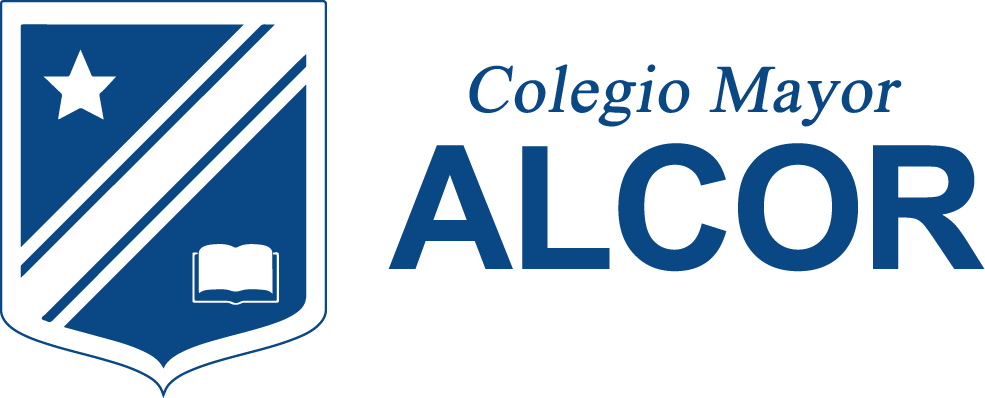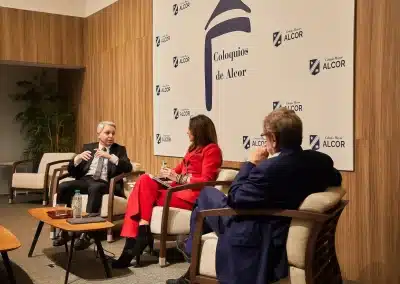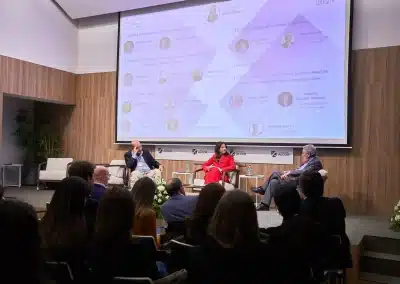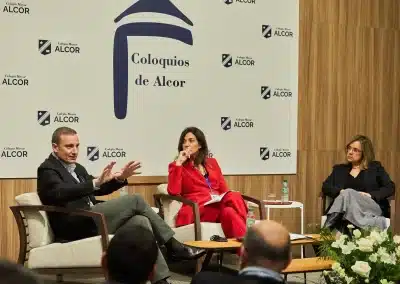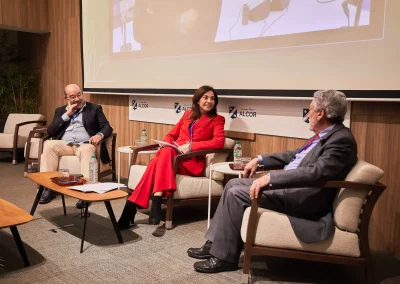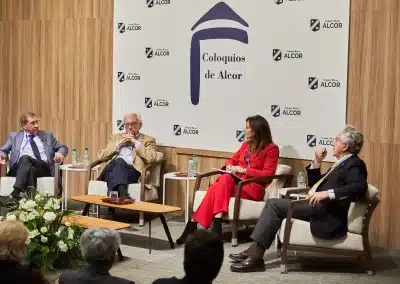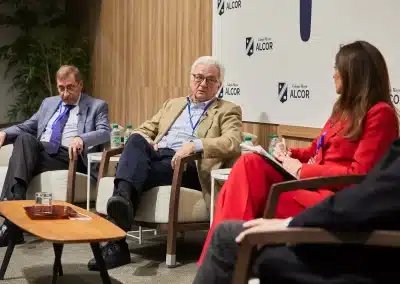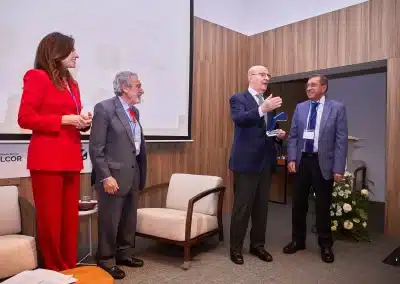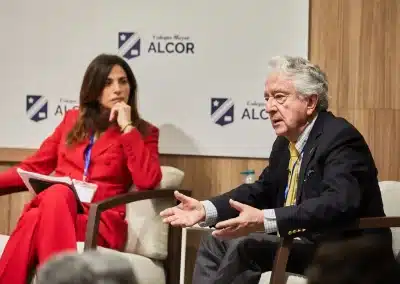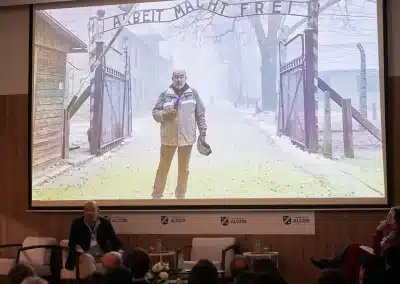Alcor Colloquia
Between 1972 and 1994, the Alcor Colloquia brought togeteher more than 300 national and international journalists to reflecto n media in a Spain in transition to democracy.
What began as a “Check-up on Information” became a key fórum for defending press freedom and consolidating the role of the Fourth Estate: Many of these professionals remain committed to this cause today.
In the current context, and within the framework of the Action Plan for European Democracy, the importance of Article 20 of the Spanish Constitution which protects freedom of expression and information, is recalled. The Alcor Colloquia pay tribute to those who promoted this legacy and to those who have passed away, resuming dialogue as a tribute to their commitment.
The Alcor Colloquia are held annually with various themes under the motto of Building the Future and Defending Freedom.
2025 ALCOR COLOQUIA
Last Wednesday, January 29, 2025, under the Honorary Presidence of Her Majesty Queen Letizia, the Alcor College auditórium revived a tradition that for 22 year had positioned itself as a benchmark for reflection on journalism and freedom of though in Madrid society. On that day, the so-called Alcor Colloquia took up the mantle of continuing to build the future and educate in freedom, now also paving the way for disciplines other tan journalism.
With Marilo Montero acting as presenter, “A review of information in 2025” featured Vicente Vallés, director and presenter of Noticias 2 on Antena 3—the journalist currently closest to being a “rock star,” as Mariló Montero pointed out—and the director-founder of the newspaper El País and member of the Royal Spanish Academy, Juan Luis Cebrián. For both of them, the press, or whatever you want to call it today, will continue to be useful to society, both for its informative work and for acting as a counterweight to a political power that is increasingly trying to hinder that function.
For Cebrian, the current technological change represents a revolution “greater tan the printing press”. The internet and social media have become a polarizing arena “98% of advertising is concentrated on social media” given that more and more people, especially Young people, but not only them, are getting their information through social media, it is important that “serious” media outlets also be present online to provide information.
There are brutal campaigns to discredit media outlets that don´t support certain political positions, and there are attempts, such as the one now being explored by the current Spanish government, to control the media. Cebrian is blunt: “ The Spanish Constitution prohibits any type of prior censorship”. He adds “Without press clippings, all the political corruption that occurs in democratic countries would not have been exposed: Watergate, GAL, Filesa, Gurtel…”
The second panel, “The mainstream media under scrutiny,” featured ABC deputy editor Elena de Miguel and Álvaro Nieto, editor of The Objective, who uncovered the Delcy case in Vox Populi and the Koldo case in the digital newspaper he runs, among others, and who urges us to keep an eye on Plus Ultra. It is “press clippings that expose the corruption of power,” and this has caused tensions between journalists and politicians.
The liner business structures of digital newspapers than of traditional newspapers allw them to compete better. Nieto advocates open journalism, a journalist must select what´s happening and worth reporting and organize ir, in fact, her masthead only features boutique topics daily.
The Val maestro, who defines himself and his partners Ernesto Sáenz de Buruaga as hypochondriacs, asserts that in his case, he is a permanent, intermittent hypochondriac, who has embraced medical journalism to humanize medicine “Look me in the eyes”. An infinite human being, he continues to be moved today, just as he was when he recounted the attack on the Zaragoza barracks pepetrated by the terrorist group ETA live with ñaki Gabilondo, during whiche he had to describe the discovery of an empty crib containing a doll whose owner had been blown to bits by the explosión.
For him who daily discusses the topic of the day, he declares that he doen´t writte letters to arrogant people and that he has worked in so many outlets while respecting their editorial line.
Live broadcasting can be done from anywhere in the world; you just have to want to go to the places, and he gave us examples: Auschwitz on its 80th anniversary. (just 200 km from the Ukrainian border), Mexico City, the Church of Soledad who welcomes black people from the Congo on their way to the US, enthusiastically recounts the hour and a quarter he spent with Zelensky and four other Spanish journalists answering all the questions, in contrast to the embarrassment of the supposedly agreed question that Pedro Sánchez imposed on the five reporters who had traveled to Kiev during his visit to Ukraine.
His stories range from Corporal Carrasco’s cooking classes in Lebanon under UN mandate to the Green Berets in Iraq, to the kilometers of wall on the US border built by Obama, to diving into the Atlantic to rescue three people alive from a cayuco with more than 30 corpses, to the Simón Bolívar Bridge in Colombia on the border with Venezuela… These are experiences that you cannot recount in the same way if you have not been there, argued Expósito, who defends live radio because the voice does not deceive.
To conclude the day, the topic of “Spain and the right to information from the transition to the present day” was addressed, featuring a panel of journalists led by Justino Sinova, APM Vice President Luis Ayllón, and Federico Ysart.
The unanimous opinión is that only the Supreme court can sabe us, since the Prime Minister wants to remain in power and is willing to do anything. “He lacks sufficient trainingas a democratic politician” and Rubalcaba already warned of this in the PSOE (Spanish Socialist Worker´s Party), before the current president became SEcretary Genarl of that party.
For Federico Ysrat, the difference between the politicians of the transition and those of today is abysmal. Back then, they all had profesional careers outside of politics and wanted to pacify the future by reaching agreements. Today, democracy is largely partisan. Sixty percent of the current chamber has never held salaried Jobs; and primaries have created strongmen, forming castes with a closed electoral law.
Regarding ethics and journalists’ freedom to write, Ysart refers to the “conscience clause” as a safeguard against justice. For Sinova, the “synchronized opinion team” consists of journalists who repeat what ministers say, and this allows the government to count on social support, a loudspeaker amplified by social media; only in this way can the cushion of votes from citizens unaware of the real information be explained.
With regard to press associations, Ayllón points out that they find it very difficult to issue press releases that have an impact when the press is under attack, citing as an example the Democratic Regeneration Law, 50% of which deals with the press.
The damage to Spain’s image abroad was also discussed, citing as an example the recent visit by the NATO secretary general, who did not pose for photos with the president or hold a press conference, unlike in all the other countries he visited.
With regard to the role of women in the media, although they are present in newsrooms and classrooms, they do not manage to reach management positions in the media, television, or radio.
